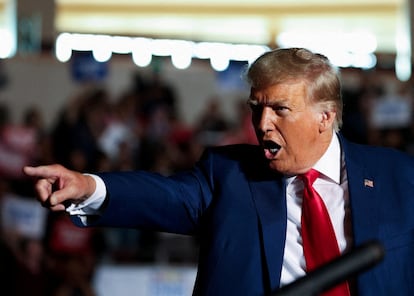Don Trump and the gangsters
The former president, an excellent reader of his society, discovered that there is no rule that cannot be violated. You just have to do it without apologizing

Last April, when I called Donald Trump a gangster in this newspaper, I was making a mere judgment call about his attitude during the famous conversation he had in 2019 with Volodymyr Zelenskiy. Now, months after that column and years after the conversation, a prosecutor from the state of Georgia has accused Trump of conduct that represents criminal behavior at the federal level, and to do so she has relied on a law that Americans know as RICO. The acronym means Racketeer Influenced and Corrupt Organizations, and the law was drafted in 1970 to fight mafia groups and gangsters. The fact that it now serves to seriously threaten a former president of the United States — showing that it is not a baseless fantasy that a former U.S. president could be considered the leader of a corrupt organization — has to be one of the strangest episodes in recent American history, at least since Nixon looked into the camera and said: “I am not a crook.”
You will remember the call if you have followed Trump’s exciting fall from grace like I have. It is exciting, of course, because it is not a fall from grace at all: the former mobster-like president is today the leader of the Republican party in the race for the next presidential elections, and his followers keep donating huge amounts of money that are going towards his legal fees without them even realizing that he is scamming them, too. There’s no way to fit into an op-ed column the number of reasons why this is disheartening and frustrating, but it is; or perhaps it is simply a regrettable sign of the general path of decay in which not just a political party but an entire democracy has embarked. What would be a mistake is to act too surprised, because U.S. democracy has been bursting at the seams for years. Until now things had not exploded into pieces because there was still a certain respect for form that forced people into hypocrisy. Trump, an excellent reader of his society, discovered that there is no rule that cannot be violated. You just have to do it without apologizing.
Anyway, back to the call. Trump suggested by phone to the Ukrainian president that, in exchange for U.S. military support at a time of need, he should help him look for dirt on Hunter Biden, and anyone who has heard the recording will recognize the classic tone of the movie gangster: “I do this for you, but I expect you to do that for me.” (To be exact, Trump said, “Do us a favor.” The plural is almost a parody, as if Trump had just watched an episode of The Sopranos.) The call was so scandalous that it led straight to the president’s first impeachment trial, and it also showed many what Trump was capable of doing to win an election. His only defense was to repeat that the call had been “perfect.”
Until now things had not exploded into pieces because there was still a certain respect for form that forced people into hypocrisy
Well, months later we began talking about another “perfect call”: when Trump pressured the Secretary of State of Georgia over the phone to “get” him the more than 11,000 votes he needed to defeat Joe Biden. There is also a recording of the second perfect conversation; There is no president – again, since Nixon – who has had so many compromising words recorded. There are those who say that this is testimony to Trump’s stupidity, but it seems to me that it rather demonstrates his invulnerable conviction of being above the law: even before witnessing his improbable election, we spectators of U.S. politics knew that his idea of causes and consequences is not the same as other people’s. There are the unforgettable and grotesque phrases worthy of a sexual harasser boasting about grabbing women by the vulva and that the women allowed him to do so (I could insert a huge footnote here about recent events, but I won’t: some other time I will write a column about the strange idea that certain men have of what women allow and do not allow). In any case, we naïve people then thought that his campaign was hopelessly lost. But it wasn’t like that.
What I mean is that Donald Trump believes, because the world has shown him that it is so, that the consequences of one’s actions are something that happens to others. For those like him, that relationship breaks down or doesn’t work at all: remember when he said, suddenly inhabited by the ghost of Tony Soprano, that he could shoot someone in the middle of Fifth Avenue without anything happening to him? This is how Trump has grown, both in the business world and in the political world: his lawyer and mentor of many years, the famous Roy Cohn, was also the lawyer for gangsters like Gordo Tony Salerno and John Gotti. A fantastic article by the journalist David Corn was recently published in Mother Jones about Trump’s historical ties to organized crime, since he started his casino business in Atlantic City by leasing property to two unsavory characters: an FBI informant mobster and a gangster connected to the Philadelphia mafia. Corn recalls that Trump has frequently boasted – when it serves him to impress his interlocutor, for example – about his contacts with gangsters, although later, in front of a judge, he denied them with impunity.
That is why it is such poetic justice, looking at the matter carefully, that it is a law against the mafia that now has Trump in its sights. In the four years of his presidency, his behavior was that of a gangster, and it continues to be so now, as former president, when he uses Twitter to intimidate prosecutors or to threaten – indirectly, like gangsters do – judges or witnesses. One of the first to call out Trump’s behavior was James Comey, the FBI director whose reckless statements regarding the Hillary Clinton email case provided candidate Trump with no small amount of help. Comey talks in his memoir about a dinner at the White House that has come to be known as The Loyalty Dinner. Trump invited Comey to a private dinner, and in the middle of it (and in ominous tones) he told him: “I need loyalty. “I expect loyalty.” Comey writes that it felt like Sammy El Toro’s induction ceremony into Cosa Nostra.
Sammy The Bull Gravano was one of the leaders of the famous Gambino family. The Gambino family is, as anyone who has seen enough Coppola or Scorsese movies knows, one of the big five organized crime families on the East Coast. I’ve been thinking about those old gangsters these days, after we all saw the mugshot of a former U.S. president in the press: number PO1135809. The man’s look is so overacted—the school bully’s pout, the brow furrowed to the point of cramp—that it would be laughable if it didn’t have the implications it does. I have seen somewhere the photo of John Gotti, arrested in the 1990s, smiling at the camera with his double chin and his real hair. No, Trump doesn’t smile. Who knows why not.
Sign up for our weekly newsletter to get more English-language news coverage from EL PAÍS USA Edition
Tu suscripción se está usando en otro dispositivo
¿Quieres añadir otro usuario a tu suscripción?
Si continúas leyendo en este dispositivo, no se podrá leer en el otro.
FlechaTu suscripción se está usando en otro dispositivo y solo puedes acceder a EL PAÍS desde un dispositivo a la vez.
Si quieres compartir tu cuenta, cambia tu suscripción a la modalidad Premium, así podrás añadir otro usuario. Cada uno accederá con su propia cuenta de email, lo que os permitirá personalizar vuestra experiencia en EL PAÍS.
¿Tienes una suscripción de empresa? Accede aquí para contratar más cuentas.
En el caso de no saber quién está usando tu cuenta, te recomendamos cambiar tu contraseña aquí.
Si decides continuar compartiendo tu cuenta, este mensaje se mostrará en tu dispositivo y en el de la otra persona que está usando tu cuenta de forma indefinida, afectando a tu experiencia de lectura. Puedes consultar aquí los términos y condiciones de la suscripción digital.









































